Making it Easier: Ensuring an Inclusive Economy for Small Businesses in Europe – Bringing together Small Businesses and Policymakers
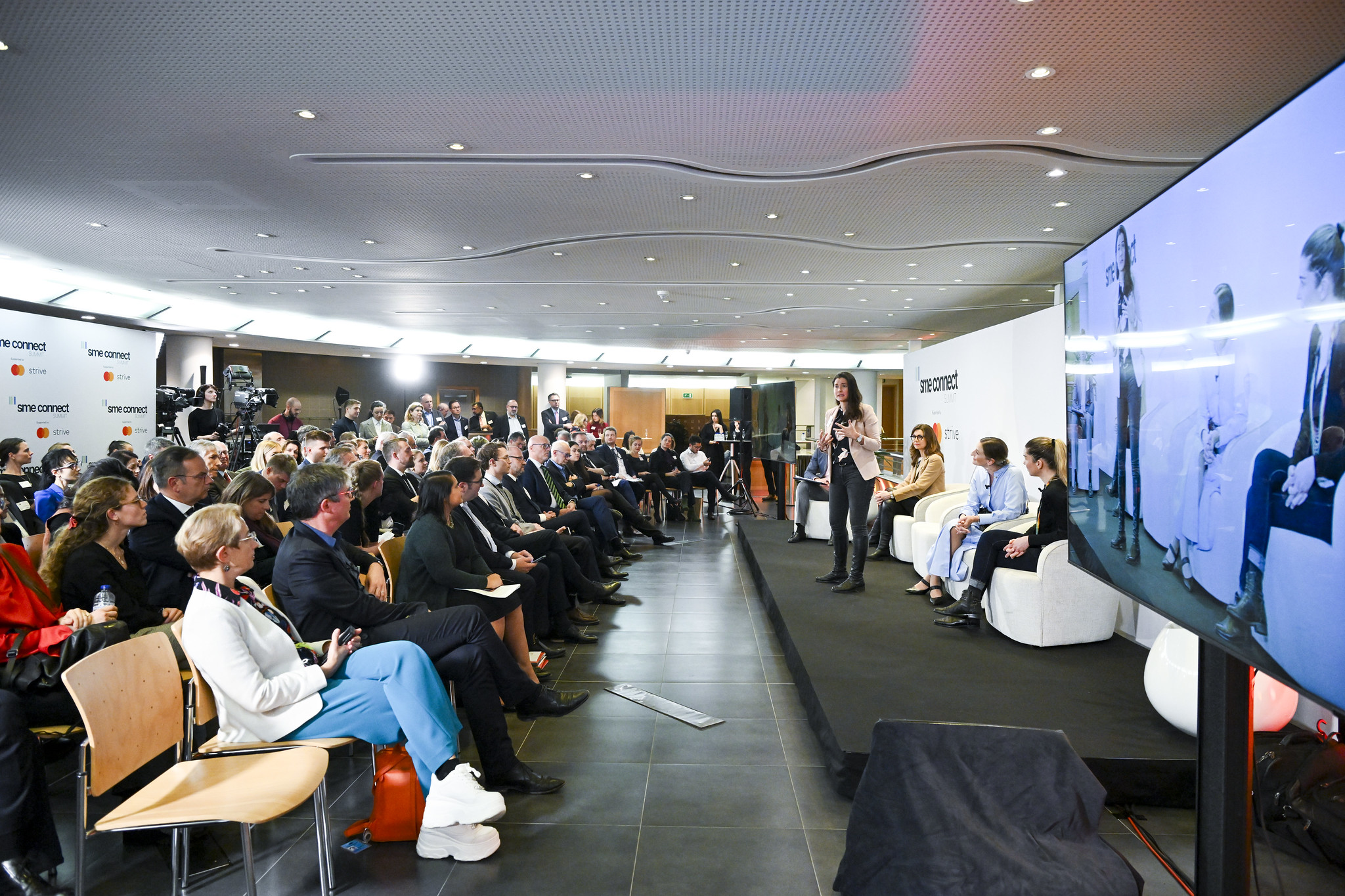
On Wednesday, November 29, 2023, SME Connect hosted a summit titled ‘Making it Easier: Ensuring an Inclusive Economy for Small Businesses in Europe.’ This significant occasion served as a platform to give European entrepreneurs the stage they deserve and brought together all those committed to their success. The summit was supported by Strive, a philanthropic portfolio under the umbrella of the Mastercard Center for Inclusive Growth, dedicated to empowering small businesses globally to flourish in the digital economy. The event found its venue at the European Parliament in Brussels and was graciously hosted by Ivan Stefanec MEP. The evening was guided by masters of the ceremony, Dr. Horst Heitz, Chair of the Steering Committee of SME Connect and Glen Hodgson, President of the European Freelance Movement.
It was truly inspiring to witness so many and diverse SME leaders gatherd in one place. The evening was crafted to honor and amplify the voices of SMEs, underscoring their vital role within communities and their significance to consumers. These enterprises don’t just form the backbone of the European economy; they also embody the essence of our society. SMEs serve as the beating heart, carrying forward both tradition and the promise of Europe’s future.
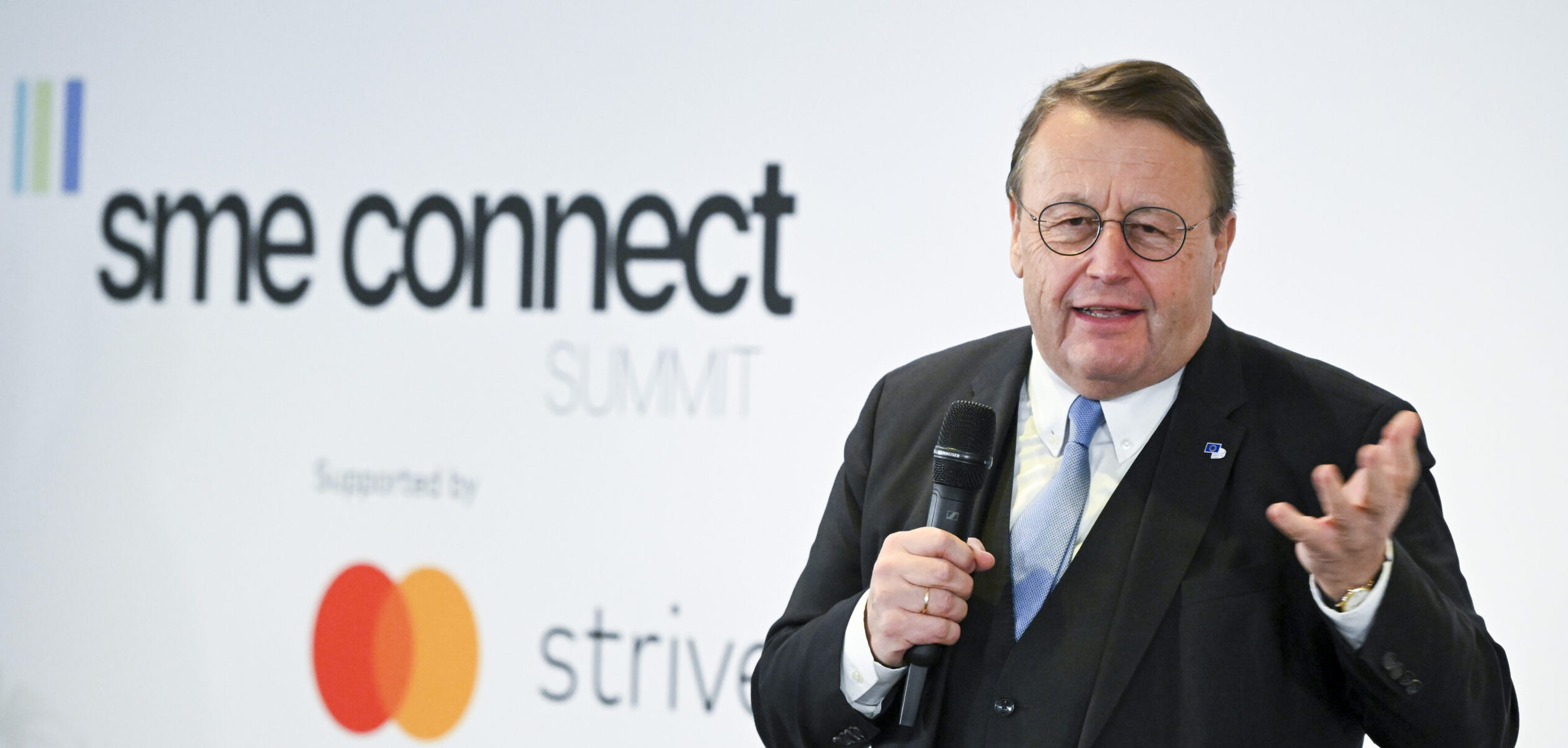
During his welcome address, DR. PAUL RÜBIG, President of SME Connect, emphasized the paramount importance of European policymakers prioritizing the interests of SMEs. He highlighted their indispensable role in maintaining Europe’s ongoing competitiveness and prosperity. Running a thriving small business in Europe is getting harder, not easier hence the critical need to eliminate all barriers hindering their growth and success.

IVAN STEFANEC MEP, our esteemed host, proposed a transformative shift in legislative mindset — one that transcends singular legislations to revamp the entire ecosystem in favor of European entrepreneurs. There is a call for European policy to innovate more and regulate less.
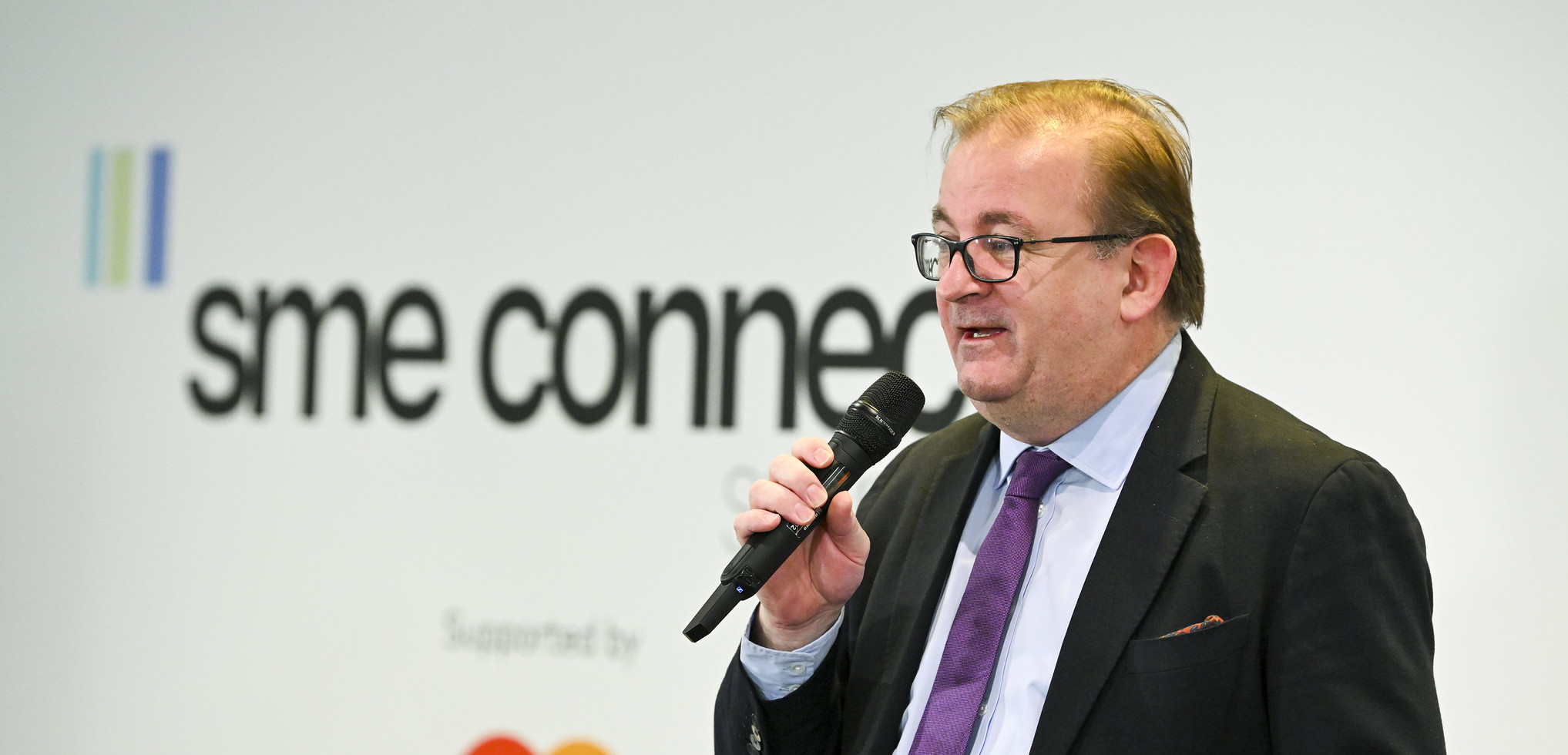
MARK BARNETT, President of Mastercard Europe, provided an insightful overview of Mastercard’s programs aimed at bolstering SMEs, notably highlighting Strive. This initiative focuses on three pivotal areas: facilitating access to working capital, fostering digitalization, and enhancing access to skills, knowledge, and mentorship for SMEs. Additionally, Mr. Barnett unveiled the launch of Strive EU, introducing a substantial fund dedicated to supporting innovative businesses able to contribute to the overall digitalisation of the SME landscape in Europe. He also announced the establishment of the Strive EU Small Business Council—a collaborative public-private partnership designed to drive policy advancements and elevate the entrepreneurial ecosystem.
 In his greeting address, TOBIAS GOTTHARDT, Secretary of State at the Bavarian State Ministry of Economy, County Development, and Energy, emphasized the significance of not only amplifying the voices of Europe’s Member States and regions in Brussels but also advocating for Europe at the local level. He stressed the need for a unified Europe that not only stands together but also actively produces tangible results.
In his greeting address, TOBIAS GOTTHARDT, Secretary of State at the Bavarian State Ministry of Economy, County Development, and Energy, emphasized the significance of not only amplifying the voices of Europe’s Member States and regions in Brussels but also advocating for Europe at the local level. He stressed the need for a unified Europe that not only stands together but also actively produces tangible results.
 The event proceeded with an engaging Spark Talk titled ‘The Reality of European Small Businesses‘ where multiple small business owners shared their entrepreneurial journeys, challenges, and future aspirations. NINA BOJORGE, Co-founder and CEO of Kakaoliebe passionately recounted her entrepreneurial story. Inspired by Central America’s ethos and introduced to sustainable cacao production practices, Nina, alongside her husband Ismael, embarked on their journey to source sustainable cacao and make a transformative impact in the industry. Established in 2020, Kakaoliebe’s inception involved setting up a production facility amidst the COVID pandemic’s uncertainties. Despite facing challenges, particularly regarding rising energy costs, Nina draws motivation from a robust network of business partners and customers, many of whom are SMEs. She emphasized the importance of entrepreneurs sharing knowledge generously, fostering stronger networks, and offering mutual support. It is a spirit of co-creation that will move us forward and help overcome challenges that lie ahead.
The event proceeded with an engaging Spark Talk titled ‘The Reality of European Small Businesses‘ where multiple small business owners shared their entrepreneurial journeys, challenges, and future aspirations. NINA BOJORGE, Co-founder and CEO of Kakaoliebe passionately recounted her entrepreneurial story. Inspired by Central America’s ethos and introduced to sustainable cacao production practices, Nina, alongside her husband Ismael, embarked on their journey to source sustainable cacao and make a transformative impact in the industry. Established in 2020, Kakaoliebe’s inception involved setting up a production facility amidst the COVID pandemic’s uncertainties. Despite facing challenges, particularly regarding rising energy costs, Nina draws motivation from a robust network of business partners and customers, many of whom are SMEs. She emphasized the importance of entrepreneurs sharing knowledge generously, fostering stronger networks, and offering mutual support. It is a spirit of co-creation that will move us forward and help overcome challenges that lie ahead.
 ANNEMETTE VOSS FRIDTHJOF, a prominent designer, artist, and the visionary behind All by Voss, built her enterprise with unwavering support from family and friends. As a recognized figure in Danish media, Annemette leverages her platform to advocate for entrepreneurship, shedding light on its challenges and triumphs. Emphasizing the role of women in business, Annemette urges individuals not only to admire well-known corporate giants but also to recognize and appreciate the impact of small businesses often overlooked by the wider public. She encourages entrepreneurs to raise their voices, amplifying the experiences and requirements of the often ‘invisible’ small business community. Annemette’s appeal extends to policymakers, urging them to simplify and innovate their communication with entrepreneurs so that all can understand better how to navigate the complex business landscape and pave their way for sustained growth.
ANNEMETTE VOSS FRIDTHJOF, a prominent designer, artist, and the visionary behind All by Voss, built her enterprise with unwavering support from family and friends. As a recognized figure in Danish media, Annemette leverages her platform to advocate for entrepreneurship, shedding light on its challenges and triumphs. Emphasizing the role of women in business, Annemette urges individuals not only to admire well-known corporate giants but also to recognize and appreciate the impact of small businesses often overlooked by the wider public. She encourages entrepreneurs to raise their voices, amplifying the experiences and requirements of the often ‘invisible’ small business community. Annemette’s appeal extends to policymakers, urging them to simplify and innovate their communication with entrepreneurs so that all can understand better how to navigate the complex business landscape and pave their way for sustained growth.
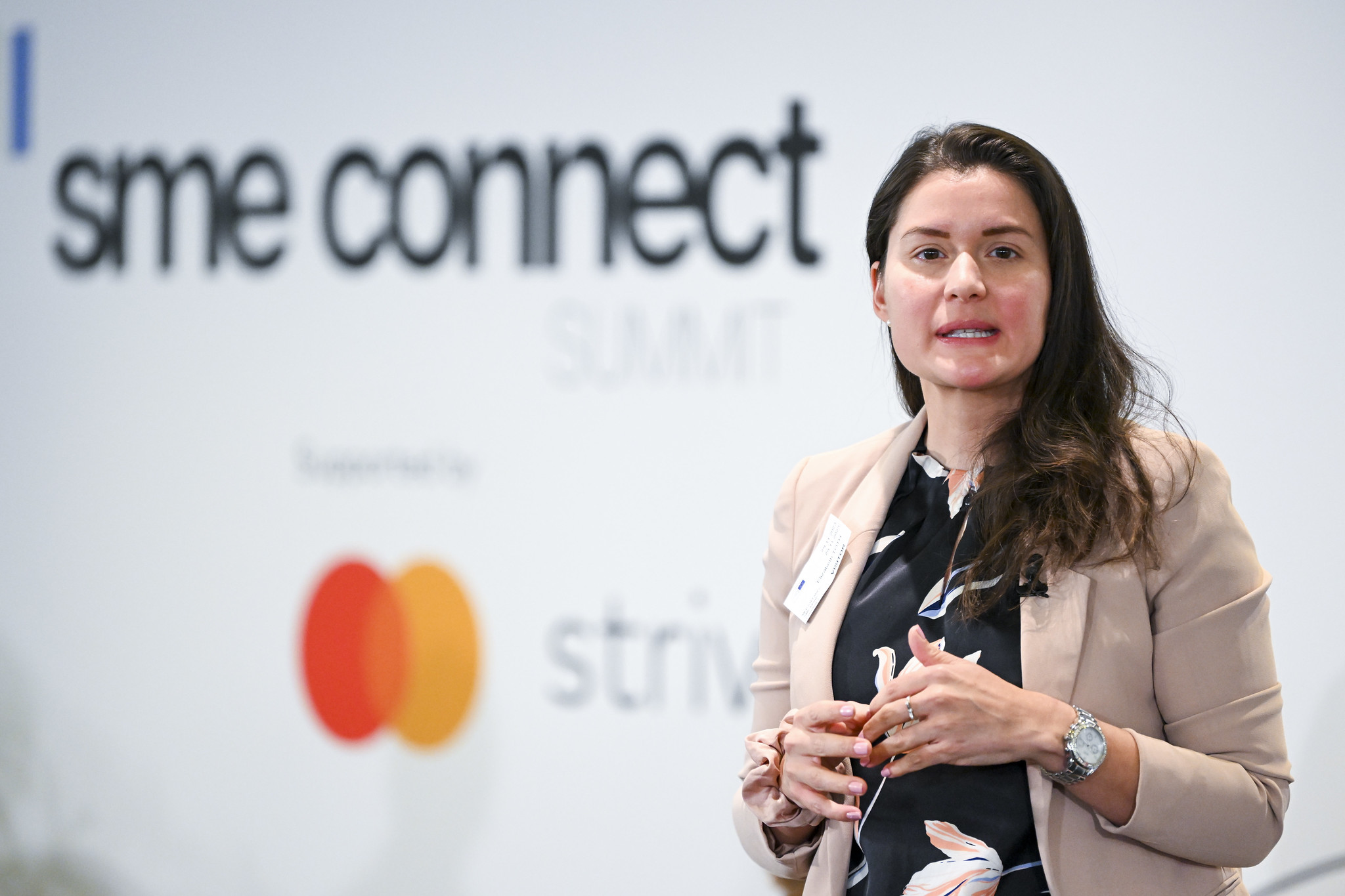 ELIZABETH TOTH, the CEO of Waste Rebel and the pioneering force behind Green Heroes, launched her venture in 2017, catalyzed by the global initiative of World CleanUp Day, which she initiated in Austria. Initially focused on educational projects with schools, her initiative has now expanded, providing consultancy services to businesses seeking sustainable practices. However, amidst her successes, Elizabeth outlined several pressing challenges. She highlighted the stark disparity between businesses that have invested in sustainability measures and those that haven’t, creating an uneven playing field. Additionally, she lamented the difficulties faced in accessing capital, especially for businesses outside the realms of green tech or mobility. Small businesses with sustainable core concepts, not reliant on high-tech solutions, struggle to secure funding. Moreover, she underscored the expense of employing personnel, emphasizing the absence of an affiliated support system. This lack of assistance often restrains small businesses, limiting their scalability and often confining them to remain as one-person companies. Elizabeth passionately advocated for a robust support framework, emphasizing the immense potential lying within Europe’s innovative minds. She stressed the urgent need to nurture this potential by establishing a comprehensive support system that extends beyond technology-driven initiatives, enabling all forms of sustainable business ideas to flourish and contribute to Europe’s growth.
ELIZABETH TOTH, the CEO of Waste Rebel and the pioneering force behind Green Heroes, launched her venture in 2017, catalyzed by the global initiative of World CleanUp Day, which she initiated in Austria. Initially focused on educational projects with schools, her initiative has now expanded, providing consultancy services to businesses seeking sustainable practices. However, amidst her successes, Elizabeth outlined several pressing challenges. She highlighted the stark disparity between businesses that have invested in sustainability measures and those that haven’t, creating an uneven playing field. Additionally, she lamented the difficulties faced in accessing capital, especially for businesses outside the realms of green tech or mobility. Small businesses with sustainable core concepts, not reliant on high-tech solutions, struggle to secure funding. Moreover, she underscored the expense of employing personnel, emphasizing the absence of an affiliated support system. This lack of assistance often restrains small businesses, limiting their scalability and often confining them to remain as one-person companies. Elizabeth passionately advocated for a robust support framework, emphasizing the immense potential lying within Europe’s innovative minds. She stressed the urgent need to nurture this potential by establishing a comprehensive support system that extends beyond technology-driven initiatives, enabling all forms of sustainable business ideas to flourish and contribute to Europe’s growth.

PERNILLE WEISS MEP expressed sincere admiration for the entrepreneurial spirit exhibited by the speakers. She urged policymakers to draw inspiration from these entrepreneurs and take proactive steps towards implementing policies that foster and support SMEs.
 The event progressed with keynote addresses by European Commission representatives. DAVID MÜLLER, Head of Cabinet of the European Commissioner Johannes Hahn, provided a comprehensive overview of the various financial instruments and funding accessible to SMEs He highlighted the European Commission’s commitment of 200 billion euros, both directly and indirectly, dedicated to supporting SMEs within the scope of cohesion policy and the new recovery and resilience facility. Mr. Müller emphasized several new initiatives aimed at streamlining access to funding for SMEs and make them user-friendly, including those developing strategic technologies like deeptech, cleantech and biotech. Additionally, he outlined a novel initiative focused on enhancing the business environment: the interoperability of public digital services. This initiative aims to alleviate administrative burdens for SMEs, contributing to a more favourable business landscape across Europe. IVO BELET, Cabinet Expert of the European Commissioner Dubravka Šuica, highlighted an additional recent initiative from the European Commission: the Demography Toolbox. This innovative initiative is aimed at tackling labour market skill shortages head-on.
The event progressed with keynote addresses by European Commission representatives. DAVID MÜLLER, Head of Cabinet of the European Commissioner Johannes Hahn, provided a comprehensive overview of the various financial instruments and funding accessible to SMEs He highlighted the European Commission’s commitment of 200 billion euros, both directly and indirectly, dedicated to supporting SMEs within the scope of cohesion policy and the new recovery and resilience facility. Mr. Müller emphasized several new initiatives aimed at streamlining access to funding for SMEs and make them user-friendly, including those developing strategic technologies like deeptech, cleantech and biotech. Additionally, he outlined a novel initiative focused on enhancing the business environment: the interoperability of public digital services. This initiative aims to alleviate administrative burdens for SMEs, contributing to a more favourable business landscape across Europe. IVO BELET, Cabinet Expert of the European Commissioner Dubravka Šuica, highlighted an additional recent initiative from the European Commission: the Demography Toolbox. This innovative initiative is aimed at tackling labour market skill shortages head-on.
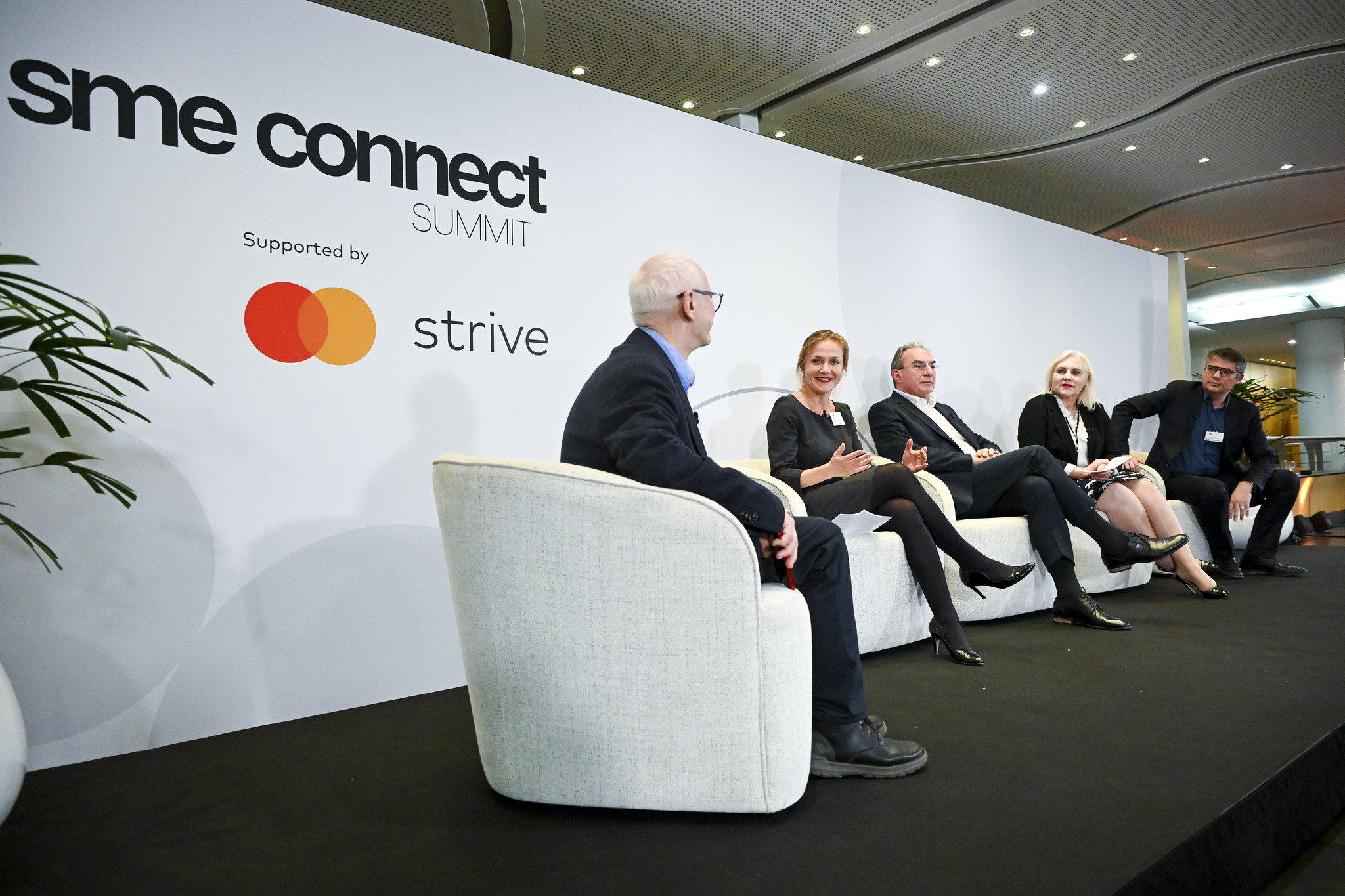 The discussion moved forward with the Flash-Panel: “What’s holding European Small Businesses Back? “ featuring ANGELIKA WINZIG MEP, IULIU WINKLER MEP, ANNA KLISSOURAS, Entrepreneur, global business consultant and coach, MICHAEL DIGUET, Co-founder & CEO of Algoan, a fintech SME based in France. The panel was moderated by DR. MICHAL BONI, SME Connect Special Advisor for Digitalisation and AI; Former Member of the European Parliament and First Minister of Digitalisation of Poland. Dr. Boni launched the debate inviting the panellists to reflect on the key challenges for SMEs in Europe as perceived by both business practitioners and legislators; and to deliberate on the necessary transformations SMEs in Europe require. ANNA KLISSOURAS highlighted the well-known barriers hindering SME development, emphasising the necessity for improved regulation, access to skilled labour, and financial resources. From her perspective, the primary challenge lies in translating these obstacles into practical solutions and integrating them into high-quality legislation. In addition to these widely acknowledged challenges, Anna suggested a better access to actionable insights of SMEs.
The discussion moved forward with the Flash-Panel: “What’s holding European Small Businesses Back? “ featuring ANGELIKA WINZIG MEP, IULIU WINKLER MEP, ANNA KLISSOURAS, Entrepreneur, global business consultant and coach, MICHAEL DIGUET, Co-founder & CEO of Algoan, a fintech SME based in France. The panel was moderated by DR. MICHAL BONI, SME Connect Special Advisor for Digitalisation and AI; Former Member of the European Parliament and First Minister of Digitalisation of Poland. Dr. Boni launched the debate inviting the panellists to reflect on the key challenges for SMEs in Europe as perceived by both business practitioners and legislators; and to deliberate on the necessary transformations SMEs in Europe require. ANNA KLISSOURAS highlighted the well-known barriers hindering SME development, emphasising the necessity for improved regulation, access to skilled labour, and financial resources. From her perspective, the primary challenge lies in translating these obstacles into practical solutions and integrating them into high-quality legislation. In addition to these widely acknowledged challenges, Anna suggested a better access to actionable insights of SMEs.
 IULIU WINKLER MEP echoed Anna’s sentiments, emphasising the necessity for SMEs to have a stronger voice. He highlighted the significance of this collective voice, very much needed for the equilibrium of opinions contributing to substantiation required for the development of legislation. His call to action for SMEs is to take a more proactive stance in articulating their positions and requirements. MICHAEL DIGUET identifies the cornerstone of SME success as streamlined access to capital and technologies that facilitate immediate access and evaluation of services. He also highlighted the disparity in resources, noting the challenge for smaller players to advocate for themselves compared to larger industry representatives. ANGELIKA WINZIG MEP, an entrepreneur herself in the past and currently serving as the Co-Chair of the SME Intergroup in the European Parliament, empathized with SMEs. She expressed regret over the fact that out of 705 Members of the European Parliament, only 10 are actively involved in SME policies, with an entrepreneurial background. Ms. Winzig highlighted the anticipation surrounding the nomination of the EU SME Envoy, emphasising the potential for amplifying SME voices and advocating for their needs on a larger scale.
IULIU WINKLER MEP echoed Anna’s sentiments, emphasising the necessity for SMEs to have a stronger voice. He highlighted the significance of this collective voice, very much needed for the equilibrium of opinions contributing to substantiation required for the development of legislation. His call to action for SMEs is to take a more proactive stance in articulating their positions and requirements. MICHAEL DIGUET identifies the cornerstone of SME success as streamlined access to capital and technologies that facilitate immediate access and evaluation of services. He also highlighted the disparity in resources, noting the challenge for smaller players to advocate for themselves compared to larger industry representatives. ANGELIKA WINZIG MEP, an entrepreneur herself in the past and currently serving as the Co-Chair of the SME Intergroup in the European Parliament, empathized with SMEs. She expressed regret over the fact that out of 705 Members of the European Parliament, only 10 are actively involved in SME policies, with an entrepreneurial background. Ms. Winzig highlighted the anticipation surrounding the nomination of the EU SME Envoy, emphasising the potential for amplifying SME voices and advocating for their needs on a larger scale.
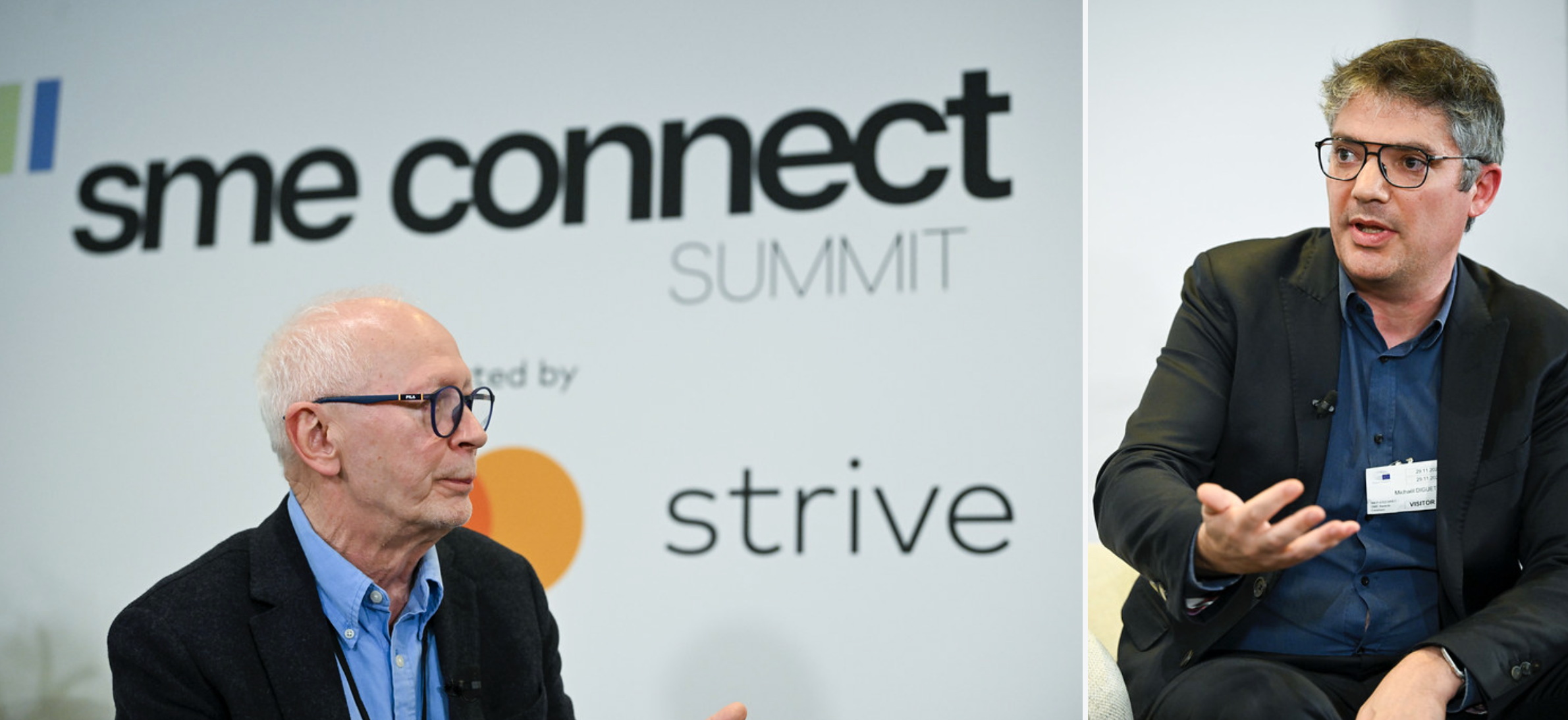 Dr. Boni then prompted the panellists to compile a “to-do list” encompassing recommendations and enhancements tailored to support SMEs. ANGELIKA WINZIG MEP advocated for political stakeholders to exhibit courage and boldness in representing their constituents, even to the extent of rejecting certain regulations, regardless of potential media backlash. ANNA KLISSOURAS proposed moving away from segregating SMEs and instead advocated for a unified approach to develop more actionable policies for general EU competitiveness. She emphasized the public sector’s need to adopt practices from the private sector, particularly in implementing data-driven regulations. This, in turn, would amplify the impact of testing and experimenting with sandboxes. Furthermore, Anna highlighted the critical need to unlock the full potential of the EU Single Market, given that statistics indicate 70% of EU SMEs are not engaging in cross-border activities. Her plea to policymakers was to transition SME support from softer approaches to more concrete, impactful policies, urging them to align actions with their words. MICHAEL DIGUET reiterated the importance of pushing for more innovation and technology in Europe. Diligent impact assessments and regulatory sandboxes should become a standard practice. IULIU WINKLER MEP proposed a heightened focus within the European Parliament on the regulatory enforcement supervision and implementation follow-up. Many solutions like multilingual info-portals or one-stop shops designed for SMEs in Brussels are not really known and promoted in the Member States. The much anticipated SME Envoy nomination should address these issues and have all the tools required to deliver tangible results. Additionally, Mr. Winkler pointed out the necessity for the Green Deal to align with Europe’s inherent strengths to prevent potential dependencies on third countries in the future.
Dr. Boni then prompted the panellists to compile a “to-do list” encompassing recommendations and enhancements tailored to support SMEs. ANGELIKA WINZIG MEP advocated for political stakeholders to exhibit courage and boldness in representing their constituents, even to the extent of rejecting certain regulations, regardless of potential media backlash. ANNA KLISSOURAS proposed moving away from segregating SMEs and instead advocated for a unified approach to develop more actionable policies for general EU competitiveness. She emphasized the public sector’s need to adopt practices from the private sector, particularly in implementing data-driven regulations. This, in turn, would amplify the impact of testing and experimenting with sandboxes. Furthermore, Anna highlighted the critical need to unlock the full potential of the EU Single Market, given that statistics indicate 70% of EU SMEs are not engaging in cross-border activities. Her plea to policymakers was to transition SME support from softer approaches to more concrete, impactful policies, urging them to align actions with their words. MICHAEL DIGUET reiterated the importance of pushing for more innovation and technology in Europe. Diligent impact assessments and regulatory sandboxes should become a standard practice. IULIU WINKLER MEP proposed a heightened focus within the European Parliament on the regulatory enforcement supervision and implementation follow-up. Many solutions like multilingual info-portals or one-stop shops designed for SMEs in Brussels are not really known and promoted in the Member States. The much anticipated SME Envoy nomination should address these issues and have all the tools required to deliver tangible results. Additionally, Mr. Winkler pointed out the necessity for the Green Deal to align with Europe’s inherent strengths to prevent potential dependencies on third countries in the future.
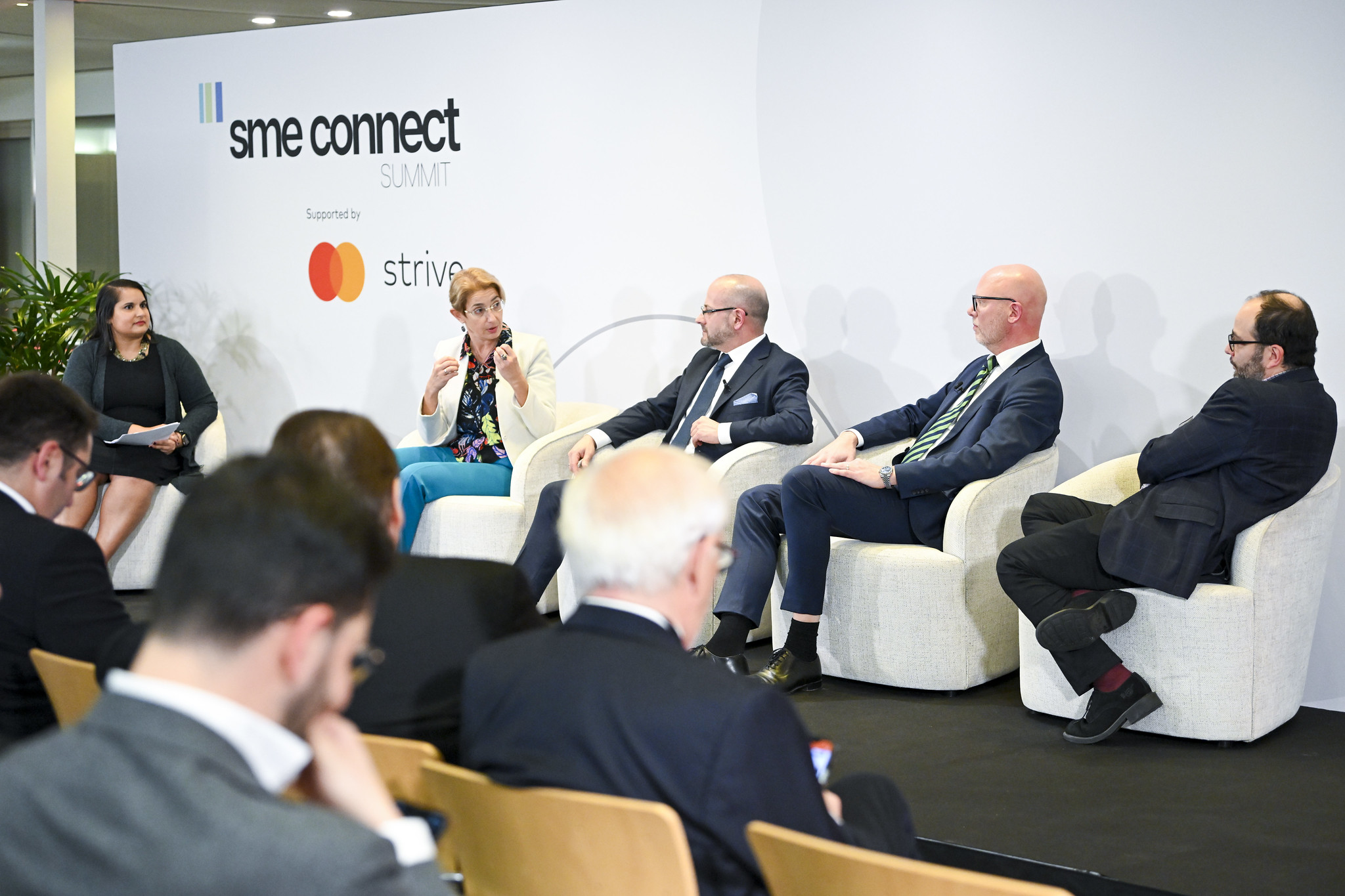 The next panel titled “The Hot Seat – From Talk to Action: Ensuring Europe Leads the Way” saw the participation of PETER KOFLER, Entrepreneur, President of Danish Entrepreneurs; MILENA ANGELOVA, Member of the European Economic and Social Committee, SME Envoy of Bulgaria; JÖRGEN WARBORN MEP and RADAN KANEV MEP. The discussion was moderated by PAYAL DALAL, Senior Vice President of Social Impact, International Markets at the Mastercard Center for Inclusive Growth. PETER KOFLER highlighted the fierce technological and ideological competition happening right now across the continents. He emphasized the imperative for Europe to reevaluate its position and vision within this competitive landscape. Peter stressed that Europe is currently witnessing a drain of both capital and talent to other global regions, signalling a need for strategic elevation to maintain competitiveness. JÖRGEN WARBORN MEP concurred with Peter on the need for Europe to engineer a remarkable turnaround, emphasizing the indispensable involvement of all stakeholders in this endeavour. Mr. Warborn expressed appreciation for the European Commission’s current approach, adhering to the “one in, one out” principle for regulatory measures. It’s paramount to recognize that each new regulatory initiative diminishes the global competitiveness of Europe’s SMEs, rather than enhancing it. Hence, every regulatory measure should be meticulously crafted to promote and align with Europe’s economic growth goals. RADAN KANEV MEP echoed the concerns expressed by previous speakers, noting the concerning trend among young Europeans who prefer being employed rather than creating jobs themselves. Despite this, Mr. Kanev acknowledged the collective willingness of all political groups to collaborate constructively for the betterment of Europe’s SMEs. However, he emphasised the crucial need to translate actions initiated in Brussels into tangible outcomes, implemented effectively by the Member States. Mr. Kanev stressed the necessity of establishing appropriate instruments to ensure that Brussels and Member States are aligned. MILENA ANGELOVA, stressed on importance of predictability and a fit for purpose legislation and an obligatory competitiveness check.
The next panel titled “The Hot Seat – From Talk to Action: Ensuring Europe Leads the Way” saw the participation of PETER KOFLER, Entrepreneur, President of Danish Entrepreneurs; MILENA ANGELOVA, Member of the European Economic and Social Committee, SME Envoy of Bulgaria; JÖRGEN WARBORN MEP and RADAN KANEV MEP. The discussion was moderated by PAYAL DALAL, Senior Vice President of Social Impact, International Markets at the Mastercard Center for Inclusive Growth. PETER KOFLER highlighted the fierce technological and ideological competition happening right now across the continents. He emphasized the imperative for Europe to reevaluate its position and vision within this competitive landscape. Peter stressed that Europe is currently witnessing a drain of both capital and talent to other global regions, signalling a need for strategic elevation to maintain competitiveness. JÖRGEN WARBORN MEP concurred with Peter on the need for Europe to engineer a remarkable turnaround, emphasizing the indispensable involvement of all stakeholders in this endeavour. Mr. Warborn expressed appreciation for the European Commission’s current approach, adhering to the “one in, one out” principle for regulatory measures. It’s paramount to recognize that each new regulatory initiative diminishes the global competitiveness of Europe’s SMEs, rather than enhancing it. Hence, every regulatory measure should be meticulously crafted to promote and align with Europe’s economic growth goals. RADAN KANEV MEP echoed the concerns expressed by previous speakers, noting the concerning trend among young Europeans who prefer being employed rather than creating jobs themselves. Despite this, Mr. Kanev acknowledged the collective willingness of all political groups to collaborate constructively for the betterment of Europe’s SMEs. However, he emphasised the crucial need to translate actions initiated in Brussels into tangible outcomes, implemented effectively by the Member States. Mr. Kanev stressed the necessity of establishing appropriate instruments to ensure that Brussels and Member States are aligned. MILENA ANGELOVA, stressed on importance of predictability and a fit for purpose legislation and an obligatory competitiveness check.
 Payal prompted the panlists to share their outlook for the future of Europe’s entrepreneurial ecosystem and a call to action. PETER KOFLER believes that Green Transition represents a major business opportunity and the area where Europe is still leading. JÖRGEN WARBORN MEP holds a strong conviction that Europe’s competitiveness issues can be addressed through the empowerment of SMEs. He advocates for a shift in the mindset of decision-makers, emphasizing the critical need for the “think small first” principle to be genuinely reflected in all legislative actions. This principle mandates that SMEs take precedence in legislation, ensuring their central position and avoiding limitations to singular charters or provisions. RADAN KANEV MEP reiterated the necessity of fostering a climate that encourages and incentivizes individuals to become job creators and take initiative. He emphasized the importance of eliminating barriers that obstruct the free flow of creative ideas, as this would contribute to making entrepreneurship more appealing and accessible. MILENA ANGELOVA urged the European Commission to follow through on its commitments and fulfil its promise of simplifying the process of doing business within the EU.
Payal prompted the panlists to share their outlook for the future of Europe’s entrepreneurial ecosystem and a call to action. PETER KOFLER believes that Green Transition represents a major business opportunity and the area where Europe is still leading. JÖRGEN WARBORN MEP holds a strong conviction that Europe’s competitiveness issues can be addressed through the empowerment of SMEs. He advocates for a shift in the mindset of decision-makers, emphasizing the critical need for the “think small first” principle to be genuinely reflected in all legislative actions. This principle mandates that SMEs take precedence in legislation, ensuring their central position and avoiding limitations to singular charters or provisions. RADAN KANEV MEP reiterated the necessity of fostering a climate that encourages and incentivizes individuals to become job creators and take initiative. He emphasized the importance of eliminating barriers that obstruct the free flow of creative ideas, as this would contribute to making entrepreneurship more appealing and accessible. MILENA ANGELOVA urged the European Commission to follow through on its commitments and fulfil its promise of simplifying the process of doing business within the EU.
 During the latter part of the event, SMEs had the opportunity to respond, sharing insightful perspectives. One notable suggestion highlighted the greater benefit in supporting European companies by reducing their risk perception among private investors, as opposed to promoting reliance on grants and governmental budgets or instituting a whistleblower system within industries, enabling individual SMEs to report instances of contradictory requirements and regulatory conflicts.
During the latter part of the event, SMEs had the opportunity to respond, sharing insightful perspectives. One notable suggestion highlighted the greater benefit in supporting European companies by reducing their risk perception among private investors, as opposed to promoting reliance on grants and governmental budgets or instituting a whistleblower system within industries, enabling individual SMEs to report instances of contradictory requirements and regulatory conflicts.
 In concluding remarks TOBIAS GOTTHARDT to confront the current reality experienced by SMEs in Europe and eliminate all frictions. DR. PAUL RÜBIG encouraged SMEs not to hesitate in directly reaching out to their political representatives and ensuring their voices are heard.
In concluding remarks TOBIAS GOTTHARDT to confront the current reality experienced by SMEs in Europe and eliminate all frictions. DR. PAUL RÜBIG encouraged SMEs not to hesitate in directly reaching out to their political representatives and ensuring their voices are heard.
The event continued with the networking reception and thematical conversation corners moderated by the experts and members of the SME Connect network MICHAEL JAEGER, Chair of the European Taxpayers Association; ELIN MCALLUM, Founder and Director of Bantani Education; MARCIN NOWACKI, Vice-President of the Union of Entrepreneurs and Employers (ZPP); HANS HOEFNAGELS, SME Connect’s Special Advisor for Digital Innovation; MAURO MASON, Executive Director of SME Connect Italia.
You can view the event’s recording on our YouTube channel